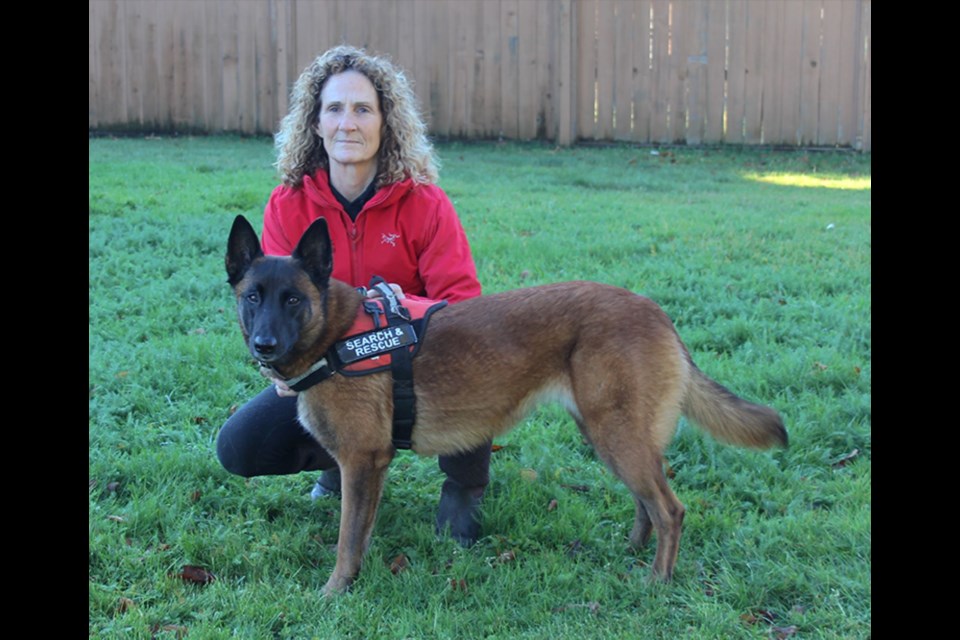‘Echo’ the Belgian Malinois, is hanging up her search-and-rescue safety vest after almost 10 years of vital work with the Sunshine Coast Search and Rescue ground team.
Owner and handler Joyce Tattersall says Echo could easily continue working, but with the addition of her second search-and-rescue dog, a Dutch shepherd named ‘Zulu,’ there’s no point in pushing the dog in case of injury.
“She will be 11-years-old in March and she's in great shape, but I do have another dog that I'm working who's three-and-a-half,” says Tattersall. “I just kind of ended up with her a bit earlier than I thought. Because Echo's health is so good, it's time. Yes, she can work well, but as they get older, if she does have an injury, is that going to put her back longer, as far as her old life goes?”
Echo was first assessed for the job at six months old and had her first official validation by a police-dog handler when she was two. Tattersall notes, it typically takes two years and hundreds of hours of training for a dog to be validated by a police-dog handler. Certified dogs must be revalidated each year.
“The reason they do that is, we work under police-dog handlers, so they know if they need a dog they know exactly how they're trained,” says Tattersall. “There are a lot of people who train their dogs to track or train their dogs to search, but if they haven't got this training, how do police handlers know if that dog is going to do the right job or not.”
Tattersall and Echo — and now Zulu — get called out when someone goes missing, but neither dog assists in the case of suspects wanted by police. The search for criminals, says Tattersall, is left up to police and their dogs.
“But I have been in on a situation after a car crash when they didn't know if there were two people in the car or just the one deceased person, so they brought me in to check out the area to see if there's anybody else,” says Tattersall. “It was still like a search, but it was a little bit different. But pretty much as soon as I hear ‘missing person,’ I'm getting my dogs ready.”
It takes about two years for a dog to be trained in air scenting, which is what Echo and Zulu are experts in, rather than ground scenting. Tattersall notes, the dogs have been trained to not only track a person or a piece of clothing by scent, but also to signal if anything smells out of the ordinary. Both dogs have previously found an article of clothing left out in the elements for more than a year.
“So, it wouldn't have a lot of human scent but it would still have different scent from what they're looking for and it's a different scent from what's in the bush regularly,” explains Tattersall. “They're pretty much scenting for something that's out of place in that area. So, we don't have to have a specific scent from that person who’s missing. We go for the strongest human scent that's in that area, so I don't have to have an article of clothing from somebody, because we work under the cops and they don't always have articles of clothing.”
As far as Echo’s “new life,” is concerned, Tattersall will continue working with her, but not with the same intensity as the past 10 years.
“She was out there with me today. She's not quite retired yet, but because she's done it all her life, I'm not just going to stop going out with her,” says Tattersall. “When I take Zulu out, I work Zulu longer, then I put her in the car and then I'll bring Echo out and do a track with her and do a small search, because she loves the work. And she can outrun my other two. She can run just as quick as Zulu and she's that old.”
In the past year, videos of other highly trained Belgian Malinois at work, with a fierce intensity, have been going viral on social media platforms, including TikTok. Tattersall says people see those videos and think, “That's what I want.”
“I go, ‘No, if you don't have the time, they don't make good pets.’ They need to be worked. If you don't work them, they'll find their own job and it might not be something great,” says Tattersall. “You really have to know how to research a Malinois to make sure you're getting the one that will work for the job, and not all them make it.”
Tattersall adds, that doesn’t mean Echo isn’t a great pet ready to enjoy more belly rubs in her retirement.
“She's loving with us and she's loving with the people she knows, but it's her choice who she makes friends with. You know how sometimes people come out and they're all over your dog? She's not that dog,” says Tattersall. “I tell people, if she wants to say hello, that's fine, but leave her alone otherwise because she's not the type of dog that likes to be smothered by people. But, I mean, she loves tummy rubs from us, her favourite people, she'll roll over on her back for them. But if she doesn't know you, she will decide if she wants to be your friend or not.”
Echo was recognized for her years of service at the annual Sunshine Coast Search and Rescue Christmas party, Dec. 8.



